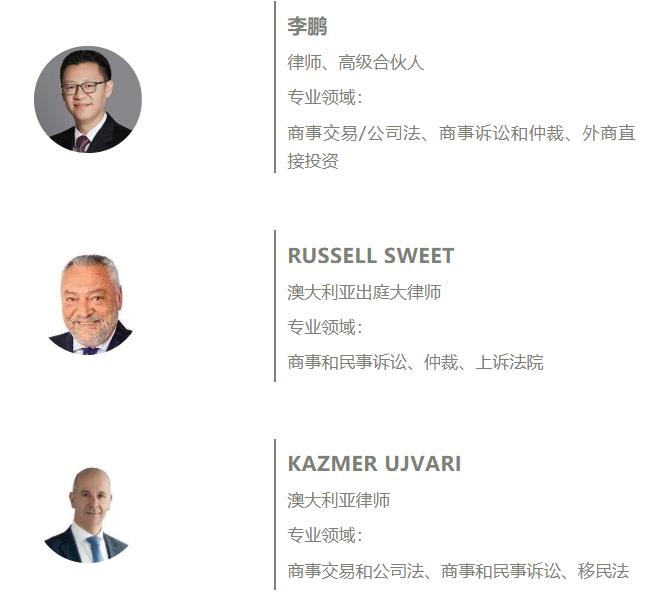文康君益诚律师联盟处理过诸多涉及澳大利亚的业务,在此基础上联盟成立了澳洲业务团队,团队成员包括多位能以英语为熟练工作语言的中国律师以及澳大利亚注册律师,其中王欲弘律师在中澳法律、投资、贸易、移民等业务领域深耕多年,还运营着以投资业务为主的澳洲基金和澳中投资平台。团队国际法律顾问祝福律师拥有澳洲律师牌照近十年,作为在澳大利亚长大的华人,熟悉中澳两国文化,处理了大量中澳跨境法律事务,经验丰富。澳洲业务团队可为文康君益诚联盟客户提供与中国-澳大利亚有关的投资、贸易、移民、跨国婚姻、诉讼等全方位、一站式的商业和法律服务。近期澳洲业务团队推出系列文章,介绍涉澳有关信息。上篇文章概述了中澳自由贸易协定的主要内容以及与澳大利亚重点产业相关的法律问题。本周的文章将对规制外商直接对澳投资的法律框架进行探讨,且重点关注外国投资审查委员会(FIRB)的作用。我们还将探讨外国投资审查委员会如何管理外国投资者收购澳洲的住宅房地产。澳大利亚的股东诉讼
Shareholder litigation in Australia
本周的文章将探讨在澳大利亚法律框架下股东可采取的救济途径。有关董事职责及董事欺诈构成要件的更多信息,请参阅我们的文章《董事欺诈:法律后果与司法救济》。
This week’s article will examine recourses available to Shareholders under the Australian legal framework. For more information on director duties and what constitutes director fraud, please see our article titled Directors fraud: consequences and remedies.本文将分为两部分。第一部分将介绍规管股东、董事及公司权利的章程,以及股东对董事提起诉讼的能力。This article will be presented in two parts. The part one will introduce the constituent agreements governing the rights of shareholders/members, directors and the company, and the ability of shareholders to bring an action against the directors.第二部分将向读者介绍股东反对董事压制行为的权利和现有的救济措施。Part two will seek to inform readers as to Shareholder’s rights against oppressive actions of directors and remedies available.
01
Company Constitution and Shareholder Agreements根据澳大利亚公司法,董事的权力是通过公司章程授予他们的,董事必须为适当的目的行使这些权力,不得越权或滥用权力。章程既规定了股东的权利,亦对股东的权利作出了规制。Under Australian corporate law, the director’s powers are conferred to them via the company’s constitution, the directors must exercise these powers for proper purposes and not to exceed or abuse these powers. The constitution also governs the rights of shareholders/members whilst stipulating their rights.公司章程受2001年《公司法》(下称“法案”、“《公司法》”)规定的管理和控制。该法案还规定了公司管理结构的形成,包括董事的任命、权力、召开董事会的程序等。一般来说,修改章程需要75%(及以上)有股东大会投票权的股东通过特别决议。The Company constitution is governed and controlled by the provisions of the Corporations Act 2001 (Cth) (“the Act”). The Act also lays down the provisions for formation of management structure of the company including the appointment of directors, their powers, procedures for conducting board meetings and so on. Ordinarily, any amendments to the constitution would require a Special resolution of 75% of Members that are entitled to vote at a general meeting.从本质上讲,公司章程是处理公司内部管理的具有约束力的合同。该合同由下列双方订立,对双方均有约束力:Essentially, the company’s constitution is a binding contract which deals with the internal management of the company. This contract is entered between and binding upon:· the company and each member,· the company and every director and secretary, and· between each member and every other member.章程还包括有关董事会权力的规定,修改章程通常需要75%(及以上)有股东大会投票权的股东通过特别决议。The constitution will also contain provisions governing the powers of the board of directors, with any amendments to the constitution ordinarily requiring a Special resolution of 75% of Members that are entitled to vote at a general meeting.另一方面,股东协议是协议签署者之间的私人合同,因此,可以通过签署者之间的协议进行修改。一般来说,股东协议是公司董事和股东之间的合约。Shareholder agreements on the other hand are private contracts between the signatories of the agreement, as such, can be amended by agreement between each of the signatories. Commonly, the shareholder agreement is a contract between the directors of the company and the signatory members.虽然公司章程对公司治理作出了广泛的规定,但股东协议是根据公司的特定目的而制定的,要考虑到公司的业务性质和股东的特定期许。
Whilst the company’s constitution will set out the broad provisions relating to the governance of the company, the Shareholders’ Agreement is tailored to the particular purposes of the company, taking into account the nature of its business and the particular wishes of its shareholders.
这两份文件应相互配合,并需要仔细起草,以确保它们不会相互冲突,不会在以明确(股东权利)为目标的情况下,反而增加了相关不确定性。
The two documents should work in conjunction with each other and need to be carefully drafted to ensure they do not conflict or add uncertainty in circumstances where certainty is the objective.
通常,公司章程是解决此类争端的起点。如果无公司章程,则公司的管理将由《公司法》的可替代规则来制定。Often, the company’s constitution will act as a starting point to resolve such disputes. If the company’s constitution is not present, then the Act’s replaceable rules will formulate the management of the company.一般来说,董事只对公司负有信义义务,而非任何特定的股东。《公司法》第181(1)条规定了这一信义义务,要求董事“本着诚信和公司的最大利益”行事。Generally, a director owes a fiduciary duty to the company only, and not to any particular shareholder. This fiduciary duty is expressed in section 181(1) of the Act requiring directors to act undefinedin good faith and in the best interests of the corporationundefined. 因此,一旦发生争议,根据争议各方的情况,需要对这两份文件进行仔细审查。文件未规定解决争议的方式,不能达成协议的,股东可以向法院提起诉讼。Consequently, once a dispute arises, and depending on the parties to the dispute, a close examination of both documents is required. If the documents do not specify the manner through which disputes are to be settled, and an agreement cannot be reached, the shareholder may take recourse through the courts.如果公司的股东之间有争议,通常第一步是审查股东协议,以检查是否有争议的解决方式。股东协议通常规定了在股东之间发生争议时要求股东遵循的程序。If there is a dispute amongst shareholders of a company, normally the first step is to review your Shareholders Agreement to check whether there is a method of resolving the dispute. It is common for shareholder agreements to set out the procedure shareholders are required to follow in the event of a dispute between shareholders.如果没有股东协议,应该检查章程中是否有条款可以帮助或指导如何解决争议或帮助确定各方的义务。If there is no Shareholders Agreement, you should check to see whether the constitution contains any provisions which may assist or provide guidance as to how to resolve the dispute or help define the parties’ obligations.如果不存在这种条款,根据《公司法》等法律,可能有衡平法上的诉讼和救济途径。If not, there may be legal causes of actions and remedies available to you in Equity, under the Act or some other legislation.Between Shareholders and Directors我们强调,公司董事对公司负有信义义务,而非对特定股东负有信义义务。但是,当董事违反了他们的信义义务,或者当他们的行为方式是压制性的(见下周发布的本文第二部分)时,(股东)可以使用法律手段。We emphasise that the company’s directors owe a fiduciary duty to the Company and not to a particular shareholder. However, legal recourse is available when either the directors have breached their fiduciary duty or if they have acted in a manner which is oppressive (examined in part 2 of this article).Actions in a Shareholder’s personal capacity根据澳大利亚的法律框架,股东可以以个人身份提起诉讼,行使其权利(的情况)主要包括:•公司行使修改章程的权力,损害了股东或股东的权利。Under the Australian legal framework, shareholders are able to bring an action in their personal capacity to enforce their rights and predominantly include:· Allotment of Shares in the company for an improper purpose; or· Where a company exercises its power to alter the constitution in a manner which harms the shareholders or their rights.Actions on behalf of the company如前所述,董事对公司负有义务,因此,英国法律首先要求公司是适格原告。这条规则起源于1843年的Foss诉Harbottle案,但逐年来确立了很多例外情况。通常而言,这些被称为派生诉讼的例外情况很难得以确认。As previously stated, a director owes his duty to the company, as such, English law primarily required the company to be the plaintiff. This rule, which stems from Foss v Harbottle in 1843, has had a number of exceptions developed over the years. These exceptions, known as derivative actions, were notoriously difficult to establish.在澳大利亚,普通法上提起派生诉讼的权利已被一项法定权利所取代,《公司法》第2F.1A部分(第236至242条)规定了其必要的程序。In Australia, the right to bring derivative actions at general law has been replaced by a statutory right, with the required procedures set out in Part 2F.1A (sections 236 to 242) of the Act.如要进行派生诉讼,第2F. 1A部分要求股东首先获得法院许可,且存在违反董事义务、不遵守章程的情况,或者是针对公司不起诉的第三人而提起诉讼的情况。For derivative actions to be commenced, Part 2F. 1A requires shareholders to firstly obtain the approval of the court and are available for breaches of director duties or the constitution, or against a third party where the company would not do so.根据第237条的规定,如法院认为符合下列条件,便须准予申请:(a)公司本身可能不会提起诉讼,或不对诉讼或诉讼中的步骤承担适当责任;和(d)如果申请人申请法院许可是为了提起诉讼,则这一严重问题需要审慎处理。Under the section 237, the court must grant the application if it is satisfied that:(a) it is probable that the company will not itself bring the proceedings, or properly take responsibility for them, or for the steps in them; and(b) the applicant is acting in good faith; and(c) it is in the best interests of the company that the applicant be granted leave; and(d) if the applicant is applying for leave to bring proceedings - there is a serious question to be tried.如果是针对第三方的诉讼,则第237(3)条规定了一个反驳的理由,即如果公司根据其董事的决议,决定不提起诉讼,或(为他人对公司提起的诉讼)进行辩护,或终止诉讼,则只要董事的行为符合商业判断原则,董事就不为此承担责任。If the proceedings are against a third party, section 237(3) then sets out a rebuttable presumption which is established if the company, by a decision of its directors, has decided not to bring the proceedings or not to defend them or to discontinue them, through the application of the Business Judgment Rule.本文的第一部分到此结束。第二部分将研究股东针对压制行为提起的诉讼。This concludes Part 1 of this article. Part 2 will examine Shareholder action against oppressive conduct.无论您想在澳大利亚设立子公司还是收购澳大利亚公司股权或资产,文康-君益诚涉澳法律团队将为中国投资者提供最专业且全面的一站式服务。
通过与从事双边贸易和跨境投资的中澳跨国公司长期合作,我们拥有丰富的法律服务经验。Whether you are seeking to establish a local Australian subsidiary or acquiring an interest in an Australian company or asset, Wincon – JYC Law Group’s Australia Legal Team provides an integrated end to end solution to Chinese investors. Our experience comes from a history of working with Chinese and Australian multinationals engaged in bilateral trade and cross border investments.













